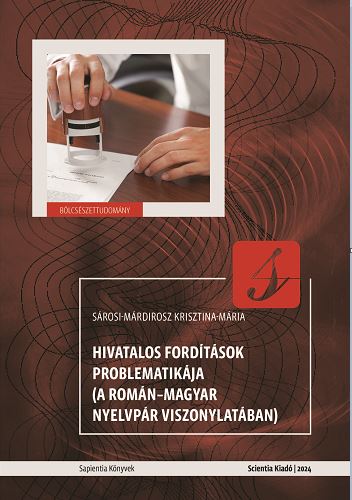Hivatalos fordítások problematikája (a román–magyar nyelvpár viszonylatában)
Problems of Translations in the Case of the Language of Official Documents (The Case of Romanian–Hungarian Languages)
Author(s): Krisztina Sárosi-Márdirosz
Subject(s): Comparative Linguistics, Translation Studies
Published by: Scientia Kiadó
Keywords: parallel corpus; comparable-monolingual corpus; corpus linguistics; translation studies; theory of translation; Hungarian language; Romanian language;
Summary/Abstract: The thesis deals with two main corpora (a parallel corpus and a comparable monolingual corpus). Analysing these corpora, we tried to conduct a theoretical and a practical research at the same time. Using the methodology of corpus linguistics and thus of translation studies, we wanted to show the differences between translated and non-translated text. During the analysis, we tried to treat the translated texts as objects of research and not as secondary text products. The interpretation and re-texting of a discourse in the form of an equivalent discourse written in another language will be possible only if the translator analyses the linguistic signs according to the extra-linguistic aspects. To carryout a translation, the translator will need a minimal knowledge of both legal systems. Using the methods of comparative legal study is important not only to understand the procedures of the respective legal system but also to place the text correctly in the host culture. These methods helped us towards a better understanding of translational procedures and the elaboration of potential strategies for translation research. During the process of drawing up a comparative study, the translator gains thematic knowledge which will become active and useful only in the very moment of the translation. Regarding legal translations, the most difficult issue is the translation of legal realia. In the case of perform a translation from language A, which is Romanian, to language B, which is Hungarian, the problem is that the two juridical systems differ, so the names of different institutions will differ a lot as well. The theory of translation must deal with those subjective factors as well which appear during the act of communication among the writer of the original, the translator, and the reader of the final product (the translation).These subjective factors enter the process of translation and influence the text production. One mustn’t forget that the relation between the world and language is always a dual one: the personal experiences cannot be totally expressed, the basic units of language cannot be in total correspondence – still the act of communication is somehow possible. Even if the researchers are not able to draft a unified theory which would be valid for each unique act of translation, they can show which are the typical translational phenomena (the translationese) and what methods should be used to obtain texts which would be able to fulfill the same communicative and informative role among the final receivers. The elaboration of such methods could help towards the constitution of some general rules, which in time could be accepted as the laws of translation.
Series: Sapientia Könyvek
- Print-ISBN-13: 978-606-975-095-7
- Page Count: 326
- Publication Year: 2024
- Language: Hungarian
- eBook-PDF
- Table of Content
- Introduction

